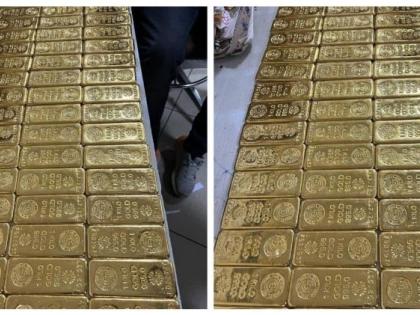Mumbai: DRI Busts Gold Smuggling Racket at Airport; Disabled Passenger Caught with Gold in Shoes
By vishal.singh | Updated: April 12, 2025 22:08 IST2025-04-12T22:04:24+5:302025-04-12T22:08:20+5:30
Acting on specific intelligence inputs, the Directorate of Revenue Intelligence (DRI) — Mumbai Zonal Unit — has unearthed a ...

Mumbai: DRI Busts Gold Smuggling Racket at Airport; Disabled Passenger Caught with Gold in Shoes
Acting on specific intelligence inputs, the Directorate of Revenue Intelligence (DRI) — Mumbai Zonal Unit — has unearthed a major gold smuggling racket operating through Chhatrapati Shivaji Maharaj International Airport (CSMIA). During the operation, officials intercepted a physically disabled passenger who was attempting to smuggle gold concealed in his shoes while seated in a wheelchair.
According to official sources, the DRI had received a tip-off about a passenger identified as Bharat Chamanlal Sheth, an Indian national, who arrived in Mumbai from Bangkok on Thai Airways flight TG-317 on the night of April 11, 2025, at around 9:55 PM. As soon as he crossed the Customs Green Channel at the airport, Sheth was stopped by the DRI team near the exit gate for inspection.
During the search, the officers discovered 14 yellow metal bars, wrapped in red paper, cleverly hidden inside the soles of Sheth's shoes. Upon testing by a government-approved valuer, the seized metal was confirmed to be gold of 96.5% purity, weighing a total of 6,735.420 grams. The market value of the seized gold has been estimated at ₹6,30,43,531.
During interrogation, it was revealed that the gold was not declared to the Indian Customs, as required by law. The accused, Bharat Sheth, neither filled out any arrival or baggage declaration forms nor informed customs officials about the consignment, confirming his intent to smuggle the gold into the country unlawfully.
In addition to the gold, the shoes used for concealment and the packing material were also seized under Section 110 of the Customs Act, 1962, as all items were liable for confiscation on grounds of illegal import.
Further questioning under Section 108 of the Customs Act led Sheth to confess that he possessed no legal documents for the gold purchase. He also admitted that the gold was intended to be smuggled into India and disclosed the name of his associate, Chintan Sanghvi, who was supposed to purchase the smuggled gold and handle payment as well as hawala transactions.
On April 12, 2025, Chintan Sanghvi was summoned and his statement was recorded, where he too confessed to being involved in the gold smuggling operation. Sanghvi revealed that he had previously purchased smuggled gold from Bharat Sheth and was awaiting the delivery of the seized consignment. Like Sheth, Sanghvi was unable to produce any legitimate documentation for the gold.
Throughout the investigation, both accused displayed non-cooperative behavior, providing evasive responses and withholding details regarding the source of funds and the potential buyers in India. The DRI suspects the involvement of more members in this international smuggling network, and efforts are ongoing to identify and apprehend them.
If the gold had been imported legally, it would have attracted a customs duty of 38.5%, amounting to approximately ₹2,42,71,759. Since the evaded duty exceeds ₹50 lakh, the offence is classified as a "serious punishable offence." Additionally, with the seized gold’s value surpassing ₹1 crore, the crime is deemed non-bailable under the law.
DRI officials highlighted that the racket is part of an international syndicate that poses a significant threat to India’s economic security by facilitating the illegal influx of foreign gold. The investigation is currently at a crucial stage, with further raids underway to trace other suspects and unravel the complete chain of hawala transactions and gold distribution linked to this network.
The agency requested the court to remand both accused to 14 days of judicial custody, citing the seriousness of the offence and the risk of tampering with evidence or absconding. The court has accepted the plea and sent the accused to judicial custody for 14 days.
Open in app